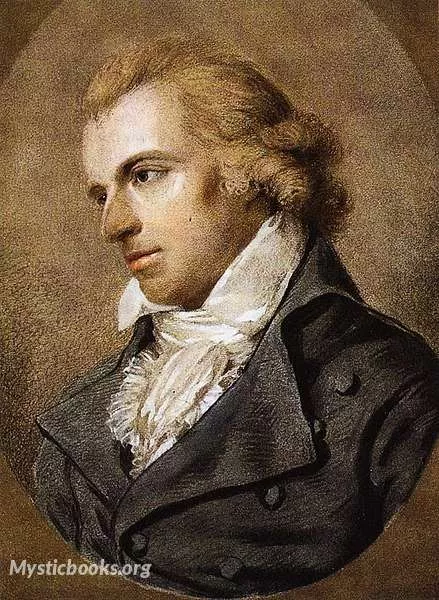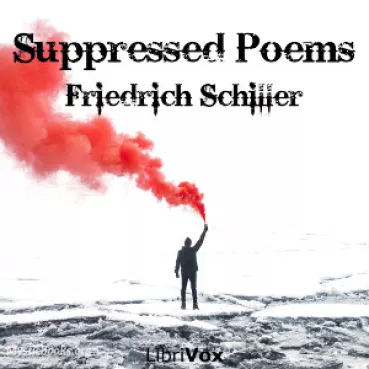
Timeline
Title
Country/Nationality
Friedrich Schiller
Johann Christoph Friedrich von Schiller was a German playwright, poet, and philosopher. During the last seventeen years of his life (1788–1805), Schiller developed a productive, if complicated, friendship with the already famous and influential Johann Wolfgang von Goethe. They frequently discussed issues concerning aesthetics, and Schiller encouraged Goethe to finish works he left as sketches. This relationship and these discussions led to a period now referred to as Weimar Classicism. They also worked together on Xenien, a collection of short satirical poems in which both Schiller and Goethe challenge opponents of their philosophical vision.
Friedrich Schiller was born on 10 November 1759, in Marbach, Württemberg, as the only son of military doctor Johann Kaspar Schiller [de] (1733–1796) and Elisabeth Dorothea Kodweiß de (1732–1802). His father was away in the Seven Years' War when Friedrich was born. He was named after king Frederick the Great, but he was called Fritz by nearly everyone. Kaspar Schiller was rarely home during the war, but he did manage to visit the family once in a while. When the war ended in 1763, Schiller's father became a recruiting officer and was stationed in Schwäbisch Gmünd. The family moved with him. Due to the high cost of living—especially the rent—the family moved to the nearby town of Lorch.
Although the family was happy in Lorch, Schiller's father found his work unsatisfying. He sometimes took his son with him In Lorch, Schiller received his primary education. The quality of the lessons was fairly bad, and Friedrich regularly cut class with his older sister. Because his parents wanted Schiller to become a priest, they had the priest of the village instruct the boy in Latin and Greek. Father Moser was a good teacher, and later Schiller named the cleric in his first play Die Räuber (The Robbers) after him. As a boy, Schiller was excited by the idea of becoming a cleric and often put on black robes and pretended to preach.
In 1766, the family left Lorch for the Duke of Württemberg's principal residence, Ludwigsburg. Schiller's father had not been paid for three years, and the family had been living on their savings but could no longer afford to do so. So Kaspar Schiller took an assignment to the garrison in Ludwigsburg.
There the boy Schiller came to the attention of Karl Eugen, Duke of Württemberg. He entered the Karlsschule Stuttgart (an elite military academy founded by the Duke), in 1773, where he eventually studied medicine. During most of his short life, he suffered from illnesses that he tried to cure himself.
While at the Karlsschule, Schiller read Rousseau and Goethe and discussed Classical ideals with his classmates. At school, he wrote his first play, The Robbers, which dramatizes the conflict between two aristocratic brothers: the elder, Karl Moor, leads a group of rebellious students into the Bohemian forest where they become Robin Hood-like bandits, while Franz Moor, the younger brother, schemes to inherit his father's considerable estate. The play's critique of social corruption and its affirmation of proto-revolutionary republican ideals astounded its original audience. Schiller became an overnight sensation. Later, Schiller would be made an honorary member of the French Republic because of this play. The play was inspired by Leisewitz' earlier play Julius of Taranto, a favourite of the young Schiller.
In 1780, he obtained a post as regimental doctor in Stuttgart, a job he disliked. In order to attend the first performance of The Robbers in Mannheim, Schiller left his regiment without permission. As a result, he was arrested, sentenced to 14 days of imprisonment, and forbidden by Karl Eugen from publishing any further works.
He fled Stuttgart in 1782, going via Frankfurt, Mannheim, Leipzig, and Dresden to Weimar. Along this journey he had an affair with an army officer's wife, Charlotte von Kalb. She was at the centre of an intellectual circle, and she was known for her cleverness and instability. Schiller needed help from his family and friends to extricate himself from his financial situation and attachment to a married woman. Schiller settled in Weimar in 1787. In 1789, he was appointed professor of History and Philosophy in Jena, where he wrote only historical works.
On 22 February 1790, Schiller married Charlotte von Lengefeld (1766–1826). Two sons (Karl Friedrich Ludwig and Ernst Friedrich Wilhelm) and two daughters (Karoline Luise Henriette and Luise Henriette Emilie) were born between 1793 and 1804. The last living descendant of Schiller was a grandchild of Emilie, Baron Alexander von Gleichen-Rußwurm, who died at Baden-Baden, Germany, in 1947.
Schiller returned with his family to Weimar from Jena in 1799. Goethe convinced him to return to playwriting. He and Goethe founded the Weimar Theater, which became the leading theater in Germany. Their collaboration helped lead to a renaissance of drama in Germany.
For his achievements, Schiller was ennobled in 1802 by the Duke of Saxe-Weimar, adding the nobiliary particle "von" to his name He remained in Weimar, Saxe-Weimar until his death at 45 from tuberculosis in 1805.
Books by Friedrich Schiller

History of the Thirty Years War, Volume 1
The History of the Thirty Years War is a five volume work, which followed his very successful History of the Revolt of the Netherlands. Written for a wider audience than Revolt, it is a vivid history, colored by Schiller’s own interest in the questio...

History of the Thirty Years War, Volume 2
The History of the Thirty Years War is a five volume work, which followed his very successful History of the Revolt of the Netherlands. Written for a wider audience than Revolt, it is a vivid history, colored by Schiller’s own interest in the questio...

History of the Thirty Years War, Volume 3
The History of the Thirty Years War is a five volume work, which followed his very successful History of the Revolt of the Netherlands. Written for a wider audience than Revolt, it is a vivid history, colored by Schiller’s own interest in the questio...

History of the Thirty Years War, Volume 4
Volume Four covers the battle of Lutzen (November, 1633) to the death of Wallenstein (February, 1634) focusing on the reaction of the Protestant forces following the death of Gustavus Adolphus at Lutzen, and Wallenstein's actions leading to his death

History of the Thirty Years War, Volume 5
Volume 5 concludes the History of the Thirty Years War in Germany.

Love and Intrigue
Intrigue and Love, sometimes Love and Intrigue, Love and Politics or Luise Miller is a five-act play written by the German dramatist Friedrich Schiller. His third play, it was first performed on 13 April 1784 at Schauspiel Frankfurt. The play shows h...

Mary Stuart
Mary Stuart is a verse play by Friedrich Schiller that depicts the last days of Mary, Queen of Scots. The play consists of five acts, each divided into several scenes. The play had its première in Weimar, Germany on 14 June 1800. The play formed the...

The Conflict
The play tells the story of a struggle for power and freedom between two men, the tyrannical Duke Charles and the idealistic Count von Moor. Written in 1782, "The Conflict" was one of Schiller's early works and is widely regarded as a masterpiece of...

Suppressed Poems
The poems that were too controversial for their time. Friedrich Schiller was one of the most important poets of the German Enlightenment. His works are known for their beauty, their intelligence, and their commitment to social justice. However, not...

Geschichte des dreißigjährigen Kriegs
Schiller (1759 - 1805), einer der Weimarer Klassiker, bekannt als Dichter und Dramatiker, studierte zunächst Medizin, wirkte auch als Philosoph und Historiker. Seine in meisterhaftem Deutsch geschriebene Geschichte des dreißigjährigen Kriegs gibt tie...

Geisterseher
Schiller (1759 - 1805), einer der Weimarer Klassiker, bekannt als Dichter und Dramatiker. Der Geisterseher (3. verbesserte Auflage 1798), sein einziger Roman, blieb unvollendet.

Historische Übersichten
Historische Übersichten by Friedrich von Schiller (1759 – 1805). Schiller, einer der Weimarer Klassiker, bekannt als Dichter und Dramatiker, gibt in meisterhaftem Deutsch kurze Darstellungen “Ueber Völkerwanderung, Kreuzzüge und Mittelalter”, “Ueber...

Geschichte des Abfalls der vereinigten Niederlande von der spanischen Regierung
Schiller, einer der Weimarer Klassiker, bekannt als Dichter und Dramatiker, beschreibt in meisterhaftem Deutsch den Beginn der Unabhängigkeit der Niederlande. Erschienen 1788-1795.(Zusammenfassung von redaer) Die Aufnahme enthält “Beilagen III. Phil...

Gesetzgebung des Lykurgus und Solon
Der Charakter eines ganzen Volks ist der treueste Abdruck seiner Gesetze und also auch der sicherste Richter ihres Werths oder Unwerths. (aus dem Text)

Verbrecher aus verlorener Ehre
Der Verbrecher aus verlorener Ehre – eine wahre Geschichte ist ein Kriminalbericht Friedrich Schillers, der 1786 zunächst unter dem Titel „Verbrechen aus Infamie“ veröffentlicht wurde. (Zusammenfassung von Wikipedia)

Don Carlos, Infant von Spanien - Ein dramatisches Gedicht
Don Karlos, Infant von Spanien ist ein Drama von Friedrich Schiller. Es behandelt vordergründig politisch-gesellschaftliche Konflikte – so die Anfänge des Achtzigjährigen Krieges, in dem die niederländischen Provinzen ihre Unabhängigkeit von Spanien...

Braut von Messina oder die feindlichen Brüder - Ein Trauerspiel mit Chören
Die Braut von Messina oder die feindlichen Brüder ist ein Drama von Friedrich Schiller, dem der Autor die Gattungskennzeichnung „Ein Trauerspiel mit Chören“ gegeben hat. (Zusammenfassung von Wikipedia) Sektion 00 - Über den Gebrauch des Chors in der...

Wallenstein - Ein dramatisches Gedicht
Wallensteins Lager ist der erste Teil von Friedrich Schillers Wallenstein-Trilogie, dem Drama über den Niedergang des berühmten Feldherren Wallenstein.Die Piccolomini ist der zweite Teil von Friedrich Schillers Wallenstein-Trilogie.Wallensteins Tod i...

Wilhelm Tell
Wilhelm Tell ist das letzte fertiggestellte Drama Friedrich von Schillers. Er schloss es 1804 ab. Das Drama nimmt den Stoff des Schweizer Nationalmythos um Wilhelm Tell und den Rütlischwur auf. (Zusammenfassung von Wikipedia) Internet Archive: weit...

Maria Stuart - Trauerspiel
Maria Stuart ist ein Drama von Friedrich von Schiller. Maria Stuart gilt als eines der klassischen Dramen Schillers. (Zusammenfassung von Wikipedia)

Kabale und Liebe - Ein bürgerliches Trauerspiel
Kabale und Liebe ist ein Drama in fünf Akten von Friedrich Schiller. Das von Schiller als Bürgerliches Trauerspiel bezeichnete Drama zeigt die durch niederträchtige Intrigen (= Kabalen) zerstörte Liebe zwischen dem Adelssohn Ferdinand von Walter und...

Verschwörung des Fiesco zu Genua
Die Verschwörung des Fiesco zu Genua ist das zweite vollendete Drama Friedrich von Schillers. Er begann das Stück, das sich an die historische Verschwörung des Giovanni Luigi de Fieschi gegen Andrea Doria in Genua des Frühjahrs 1547 anlehnt, nach der...

Jungfrau von Orleans
Die Jungfrau von Orleans ist ein Drama von Friedrich Schiller. Es nimmt den Stoff um die französische Heilige Johanna von Orléans auf. (Zusammenfassung von Wikipedia)

Huldigung der Künste
Die Huldigung der Künste ist ein dramatisches Gedicht von Friedrich Schiller. Es ist das letzte dramatische Werk Schillers. (Zusammenfassung von Wikipedia)
Showing 1 to 24 of 34 results